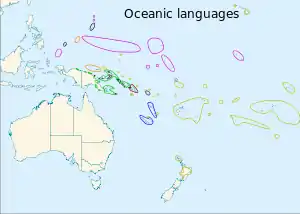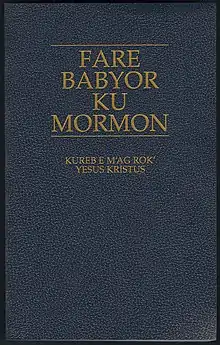Yapese language
Yapese is a language spoken by the people on the island of Yap (Federated States of Micronesia). It belongs to the Austronesian languages, more specifically to the Oceanic branch of that family. It has been difficult to classify it further, but Yapese may prove to be one of the Admiralty Islands languages.[2]
| Yapese | |
|---|---|
| Thin nu Wa’ab | |
| Native to | Federated States of Micronesia |
| Region | Island of Yap |
| Ethnicity | Yapese |
Native speakers | 5,130 (2005)[1] |
Austronesian
| |
| Dialects |
|
| Latin script | |
| Language codes | |
| ISO 639-2 | yap |
| ISO 639-3 | yap |
| Glottolog | yape1248 |
 Yapese | |
| Coordinates: 9.56°N 138.12°E | |
Orthography


Written Yapese uses Latin script. In Yapese spelling as practiced until the 1970s, the glottal stop was not written with an explicit character. A word-final glottal stop was represented by doubling the final vowel letter. Glottalization of consonants was represented with an apostrophe. In the 1970s an orthography was created which uses double vowel letters to represent long vowels; and because of the ambiguity that would occur if the glottal stop was not written, the glottal stop was written with the letter q. This new orthography using the letter q is not in universal use, but many works and maps about Yap write place names using the new q-orthography.
Phonology
Apart from a couple grammatical forms which are V, syllables are CV or CVC.
Consonants
Yapese is one of the relatively few languages in the world with ejective fricatives.[3] The Yapese ejective consonants are /pʼ tʼ kʼ fʼ θʼ/. There are also glottalised nasals /mˀ nˀ ŋˀ/ and approximants /jˀ wˀ lˀ/.[4]: 30, 34-35
In the table below, each phoneme is listed to the left of the grapheme that represents it in Yapese orthography.
| Labial | Dental | Alveolar | Palatal | Velar | Glottal | ||
|---|---|---|---|---|---|---|---|
| Nasal | plain | m ⟨m⟩ | n ⟨n⟩ | ŋ ⟨ng⟩ | |||
| glottalized | mˀ ⟨m'⟩ | nˀ ⟨n'⟩ | ŋˀ ⟨ng'⟩ | ||||
| Plosive | plain | p ⟨p⟩ | t ⟨t⟩ | k ⟨k⟩ | ʔ ⟨q/[']⟩ | ||
| ejective | pʼ ⟨p'⟩ | tʼ ⟨t'⟩ | kʼ ⟨k'⟩ | ||||
| Fricative | voiceless | f ⟨f⟩ | θ ⟨th⟩ | s ⟨s⟩ | ʃ ⟨ch⟩ | x ⟨g⟩ | (h) ⟨h⟩ |
| voiced | β ⟨b⟩ | ð ⟨d⟩ | |||||
| ejective | fʼ ⟨f'⟩[5] | θʼ ⟨th'⟩ | |||||
| Approximant | plain | l ⟨l⟩ | j ⟨y/j⟩ | w ⟨w⟩ | |||
| glottalized | lˀ ⟨l'⟩ | jˀ ⟨y'⟩ | wˀ ⟨w'⟩ | ||||
| Trill | plain | r ⟨r⟩ | |||||
/h/ ⟨h⟩ and /j/ ⟨j⟩ only occur in English and Japanese loans (/j/ ⟨y⟩ does occur in native words, however).
Vowels
In the table below, each phoneme is listed to the left of the grapheme that represents it in Yapese orthography.
| Front | Back | |||||||
|---|---|---|---|---|---|---|---|---|
| unrounded | rounded | unrounded | rounded | |||||
| short | long | short | long | short | long | short | long | |
| Close | ɪ ⟨i⟩ | iː ⟨ii⟩ | ʊ ⟨u⟩ | ʊː ⟨uu⟩ | ||||
| Mid | ɛ ⟨e⟩ | eː ⟨ee⟩ | œ ⟨ö⟩ | œː ⟨oe⟩ | ʌ ⟨a⟩ | ɔ ⟨o⟩ | ɔː ⟨oo⟩ | |
| Near-open | æ ⟨ë⟩ | æː ⟨ea⟩ | ||||||
| Open | a ⟨ä⟩ | aː ⟨ae⟩ | ɑː ⟨aa⟩ | |||||
Grammar
Reduplication
Yapese makes use of reduplication for several morphological functions, including deriving stative adjectives from inchoative adjectives, as in (1a–b), as well as to make diminutives of verbs, as in (2a-b):[4]: 112-114
(1a) roow become.red 'to become red' |
(1b) roow~roow STAT~red 'to be red' |
(2a) toey chop 'to chop' |
(2b) si-toey~toey DIM-DIM~chop 'to chop a little' |
Pronouns
Yapese distinguishes between three numbers (singular, dual, and plural) and three persons (first, second, and third), as well as clusivity in its personal pronouns.[4]: 134
| Singular | Dual | Plural | |
|---|---|---|---|
| 1.EXCL | gaeg | gamow | gamaed |
| 1.INCL | gadow | gadaed | |
| 2 | guur | gimeew | gimeed |
| 3 | qiir | yow | yaed |
A Yapese Talking Dictionary was produced by Living Tongues Institute for Endangered Languages.
References
- "Yapese". Ethnologue. 2018. Retrieved 2018-08-11.
- Lynch, John; Malcolm Ross; Terry Crowley (2002). The Oceanic languages. Richmond, Surrey: Curzon. ISBN 978-0-7007-1128-4. OCLC 48929366.
{{cite book}}: CS1 maint: multiple names: authors list (link) - Ladefoged, Peter; Maddieson, Ian (1996). The Sounds of the World's Languages. Oxford: Blackwell. p. 178. ISBN 978-0-631-19815-4.
- Jensen, John Thayer (1977). Yapese Reference Grammar. Honolulu: University of Hawai‘i Press. ISBN 978-0-8248-0476-3. OCLC 929721939.
- p32, Ballantyne, Keira Gebbie. 2005. Textual Structure and Discourse Prominence in Yapese Narrative. Doctoral dissertation, University of Hawai'i.
Bibliography
- Jensen, John Thayer. 1977. Yapese–English Dictionary. (PALI Language Texts: Micronesia.) Honolulu: University of Hawai‘i Press.
External links
- Yapese Wordlist at the Austronesian Basic Vocabulary Database
- Jensen Yapese Dictionary On-Line at www.trussel2.com
- Chepin yuu Waqab ('Events on Yap'). Yapese-language vernacular reader
- Yaat nu Waqab ('Tales of Yap'). A Yapese-language vernacular reader
- Thaaboeg (this title is a man's name). A Yapese-language vernacular reader
- Written materials about Yapese plants and animals archived with Kaipuleohone
- Index cards of plant and animal names, labeled 'Carolines [animals].' and index cards of plant and animal names, labeled 'Carolines [plants].'
- Paradisec has two collections of Arthur Capell's materials (AC1, AC2), which include Yapese language materials
- Paradisec has an open access collection of Yapese texts and a dictionary from John Jensen